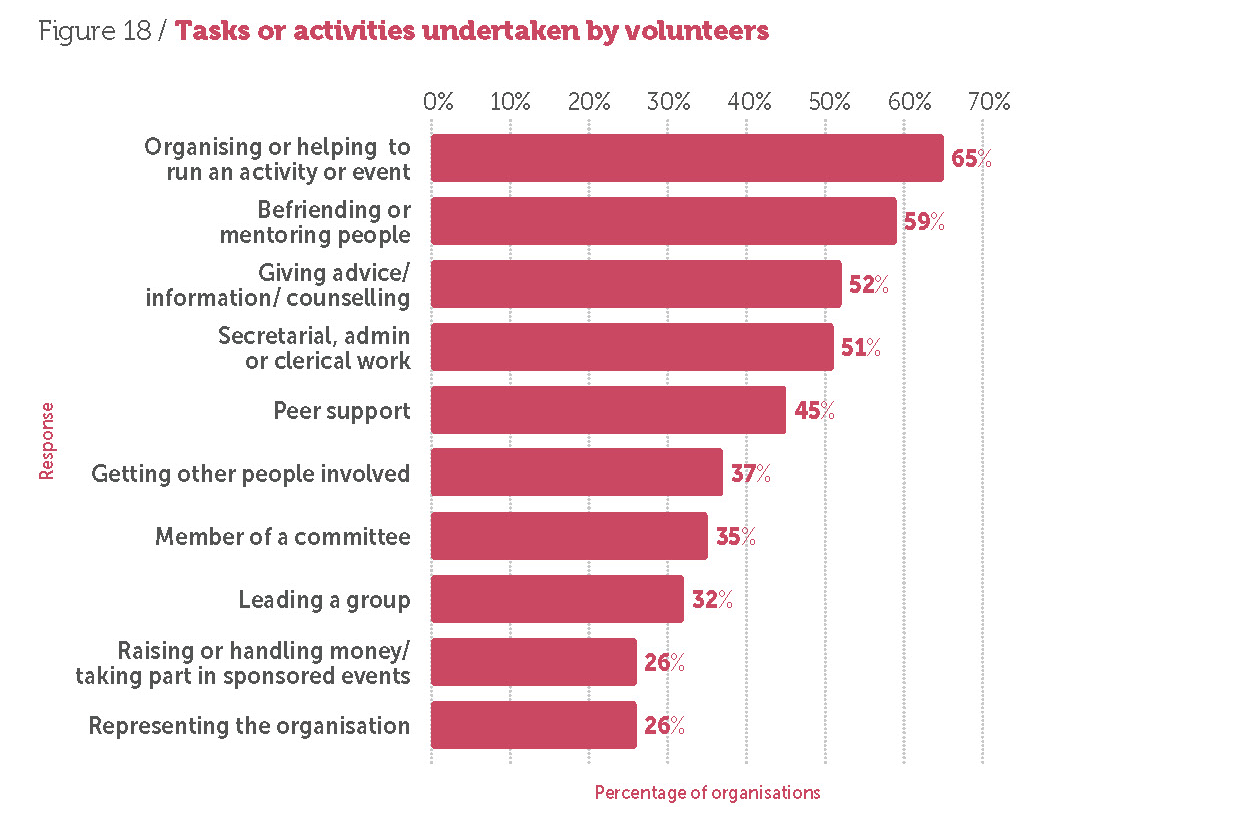Clinks conducts in-depth research on the voluntary sector working in criminal justice. In November last year we published our seventh report on the state of the sector. It marks the most detailed and up-to-date evidence we have about this unique part of the voluntary sector.
We use this evidence to help us represent and advocate for the sector with key decision makers and funders. So to help our members digest the findings we have been doing a series of blogs which takes a closer look at the key findings of each section of the report. These include: service users; service delivery; staff and volunteers; and funding.
This blog is the third in the series and will be focusing on what we found about the staff and volunteers who make the sector’s work possible.
The voluntary sector’s workforce
We already know that staff and volunteers are the backbone of the voluntary sector – without their essential support, organisations would not be able to provide their vital services. Our research looks in depth at workforce numbers, volunteer recruitment and what kind of activities volunteers undertake for organisations.
Analysis of information submitted to the Charity Commission by over 1,400 organisations that work in this sector, found that in the year 2016/17, specialist criminal justice organisations – those whose main purpose is to work in criminal justice – employed a total of 13,081 people. Whilst organisations with a different main purpose but whose service users include people in contact with the criminal justice system employed a much larger 132,271 people.
These numbers are significant. Combined this is far greater than the 49,906 full time equivalent staff employed by Her Majesty’s Prison and Probation Service (as of 30th September 2019). It indicates just how important the work of voluntary organisations is in providing services to people in contact with the criminal justice system.
The findings also show that from 2008/09 to 2016/17, the workforce of voluntary organisations in criminal justice increased (although this rise did slow down in 2016/17). This may reflect the fact that increasing numbers of people with more complex and urgent needs are accessing the sector's services. Organisations with the resources to do so may be adding to their workforce to enable them to respond to the increasing need.
However it is important to note that this analysis was only possible for organisations with an annual income over £500,000. Which means the findings do not represent the experience of smaller organisations. We know from our ongoing dialogue with the voluntary sector that smaller, community-led organisations are struggling to maintain their services in an increasingly competitive and contract-focused commissioning environment and will therefore likely struggle to employ more staff.
The role of volunteers
Volunteer numbers vastly outstrip the paid workforce of voluntary sector organisations working in criminal justice with a ratio of 9 staff for every 20 volunteers. Overall the majority of organisations have volunteers but their numbers vary widely – some report having one or two whilst others report having thousands. On average, organisations have over twice as many volunteers as staff.
The amount of their time that volunteers dedicate to organisations highlights their commitment but also how important they are to the running of organisations. For example one organisation reported that their volunteers spend in total 230 hours a month volunteering for them. On average we found volunteers give 12 hours a month to organisations.
Our findings also show what a variety of important tasks and activities volunteers undertake. The top three being:
- Organising or helping to run an event
- Befriending or mentoring people
- Giving advice, information or counselling

As our previous blog highlighted, 53% of organisations said they recruited service users as volunteers. Volunteers and employees with lived experience of the criminal justice system are extremely important. As experts by experience they play an important role in providing mentoring and peer support to others going through similar experiences, and in representing organisations. Organisations need to ensure they are dedicating the resource to prepare and support volunteers (and staff) with lived experience through these processes, especially for the potential emotional and re-triggering impacts that elements of their role could have.
In March, Clinks is holding an event that will provide an introduction to service user involvement. You’ll have the opportunity to hear from a diverse range of organisations who have successfully introduced service user involvement into the heart of their work, and from experts by experience who are now helping to shape the services that they use, for the benefit of others. You can book your place here.
Volunteer recruitment
As well as changes in workforce, we also looked at changes in volunteer recruitment. 43% of organisations said they recruited more volunteers over the last financial year. 37% said there was no change for them in volunteer recruitment whilst only 15% said they had recruited less than the year before.
When we broke the data down further, we found that organisations with fewer volunteers in the first instance were less likely to have seen any changes in volunteer recruitment. Whereas organisations with much larger numbers of volunteers were more likely to report having increased volunteer recruitment over the last financial year. For example:
- 45% of organisations with one to nine volunteers see no change in volunteer recruitment, whilst 23% are recruiting more volunteers
- 13% of organisations with 100 or more volunteers see no change in volunteer recruitment, whilst 61% are recruiting more volunteers.
This could be for a variety of reasons, including a response to the rising need of people accessing the organisations’ services. It may also suggest that organisations need to make sure they are investing in supporting and retaining volunteers.
Next time
Look out for the next blog in this series which will be looking more closely at the how services in the voluntary sector are funded. In the meantime, if you have any questions about the issues raised in this blog please contact Lauren Nickolls, Policy Officer, at lauren.nickolls@clinks.org.
What's new
Blogs
NHS staff in probation: opportunity, caution, and what must be in place
Publications
Latest on X
The role is for a leader from an organisation focused on racially minoritised people, with expertise in service delivery, policy, advocacy, or related areas in criminal justice. Racial disparities are present at every CJS stage. This role ensures these voices are central in shaping policy to help address and eradicate them. Apply by Mon 18 Nov, 10am. More info: https://www.clinks.org/voluntary-community-sector/vacancies/15566 #CriminalJustice #RR3 #RacialEquity

